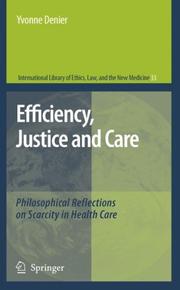| Listing 1 - 2 of 2 |
Sort by
|
Book
ISBN: 9023235479 Year: 2000 Publisher: Assen Van Gorcum
Abstract | Keywords | Export | Availability | Bookmark
 Loading...
Loading...Choose an application
- Reference Manager
- EndNote
- RefWorks (Direct export to RefWorks)
Een 'goede onderneming' staat vandaag de dag voor winst en continuïteit, maar evenzeer voor een adequate omgang met milieu en maatschappelijke omgeving. 'Maatschappelijk verantwoord ondernemen' heet de rol die bedrijven toegedicht krijgen, waar de overheid zich meer en meer terugtrekt als hoedster van gemeenschappelijke belangen. En de marktwerkingsdoctrine verliest enige glans. "Bedrijfsethiek: een goede zaak" signaleert en beschrijft deze ontwikkeling, maar biedt meer. Aan de hand van casuïstiek - zoals Heineken in Birma en Renault in Vilvoorde - worden strategieën en instrumenten beschreven, waarmee ondernemingen de morele kwaliteit van hun besluitvorming kunnen verbeteren, zoals gedragscodes, sociale en ethische doorlichtingen. De geschiedenis van ethiek biedt houvast. Waarden, deugden en morele principes zijn essentieel. Maar bedrijfsethiek is meer en meer ook bedrijfseconomie. Verantwoord ondernemen als concurrentie-strategie... (Bron: covertekst)
14 --- 174 --- 658.01 --- E080357.jpg --- Ethisch ondernemen --- Wijsgerige systemen en standpunten --- Beroepsethiek. Deontologie --- Organisatieleer --- 14 Wijsgerige systemen en standpunten

ISBN: 9781402052149 9781402052132 1402052138 Year: 2007 Publisher: Dordrecht: Springer,
Abstract | Keywords | Export | Availability | Bookmark
 Loading...
Loading...Choose an application
- Reference Manager
- EndNote
- RefWorks (Direct export to RefWorks)
What does just health care imply? Does it mean that people have a right to health care? Does it entail that there are rights-based social obligations to provide equal access to health care for everyone? And if so, why? Why are health care interests so important that they deserve special protection? What kind of social good is health care? What are its functions and do these make it different from other commodities? Furthermore, how much equality should there be in health care? What inequalities are morally acceptable and how should the burdens of achieving equality be distributed? Which matters of health care belong to the domain of justice, and which to the domain of charity? To what extent should we allow personal responsibility to play a role in allocating health care services and resources, or in distributing the costs? And what does justice require with regard to long-term care for the chronically ill and irreversibly dependent? Since the 90's, issues of scarcity, priority setting, and rationing lie at the centre of most current debates on health care. These are pressing issues: one way or another, limits have to be set. As such, the question of what is involved in just health care becomes much more complex. This complexity can be represented as an inconsistent triad, a set of three propositions of which any two are compatible but which together form a contradiction. In the case of health care, the three rival values are: social efficiency, justice, and decent-quality care. It seems to be that we can have any two but not all three. Essentially, the central question is the following: how best to square the proverbial welfare circle. How can resources be matched to needs, or needs to resources in socially acceptable and economically feasible ways? This book attempts to answer the question how health care can be incorporated into a comprehensive theory of justice, while realising an acceptable balance between efficiency, justice and care. ¦I find it (the book) to be uncommonly good. The author very carefully analyzes key philosophical positions as they have been applied in this area; the research is very thorough, the writing is clear and engaging. This book could well be used in just about any university course dealing with public health care.' Professor David Novak, University of Toronto, Canada One of the most interesting books I have read in a long time ¦a very extensive overview of some prominent modern theories of justice and their application to resource distribution in health care. Based on this it raises a number of new and original questions, some of which also receive original and convincing answers.' Professor Søren Holm, Cardiff Law School, United Kingdom
Philosophy --- Professional ethics. Deontology --- General ethics --- History of human medicine --- Hygiene. Public health. Protection --- volksgezondheid --- ethiek --- filosofie --- geneeskunde --- gezondheidszorg --- deontologie --- Public health - Moral and ethical aspects --- Health services accessibility --- Discrimination in medical care --- Social justice --- Public health --- effectiviteit (werkzaamheid, doeltreffendheid, efficiëntie) --- rechtvaardigheid (rechtvaardigheidsprincipe, distributieve rechtvaardigheid) --- Academic collection --- 14 --- 351.84 --- Access to health care --- Accessibility of health services --- Availability of health services --- Medical care --- 351.84 Sociaal zekerheidsrecht. Sociaal bestuursrecht. R.S.Z.--(sociale verzekering zie {369}) --- Sociaal zekerheidsrecht. Sociaal bestuursrecht. R.S.Z.--(sociale verzekering zie {369}) --- Equality --- Justice --- Moral and ethical aspects --- efficacité --- soins de santé --- justice (principe de justice, justice distributive, justice sociale) --- Wijsgerige systemen en standpunten --- Access --- Discrimination in medical care. --- Health services accessibility. --- Social justice. --- Moral and ethical aspects. --- Public Health --- Social Justice --- Social Discrimination
| Listing 1 - 2 of 2 |
Sort by
|

 Search
Search Feedback
Feedback About UniCat
About UniCat  Help
Help News
News